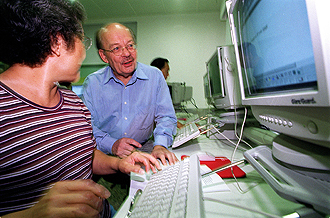 Surfing the Web can help slow the effects of age-related mental declines that can end in dementia by boosting the brain activity of the elderly, new research has found. Using brain scans, a team at the University of California, Los Angeles (UCLA) found that using the Internet stimulated the mind more strongly than reading, with effects that continued long after an Internet session had ended, the Sunday Times of London reported.
Surfing the Web can help slow the effects of age-related mental declines that can end in dementia by boosting the brain activity of the elderly, new research has found. Using brain scans, a team at the University of California, Los Angeles (UCLA) found that using the Internet stimulated the mind more strongly than reading, with effects that continued long after an Internet session had ended, the Sunday Times of London reported.
‘We found that for older people with minimal experience, performing Internet searches for even a relatively short period of time can change brain activity patterns and enhance function,’ Dr Gary Small, a professor of neuroscience at UCLA, told the newspaper. Dr Small and his team worked with 24 men and women between the ages of 55 and 78. Half of them were regular users of the Internet, while the other half had little experience online.
The researchers used a technique called functional magnetic resonance imaging, which determines the parts of the brain that are the most and least active based on changes in blood flow. The subjects were initially asked to conduct a series of Internet searches while their brains were scanned. They were then instructed to go home and carry out specified online tasks for an hour a day at least seven times in the next two weeks. Then, they had a second brain scan, again while searching the Internet. The impact began immediately, the researchers found.
The first scan demonstrated brain activity in regions controlling language, reading, memory and vision. But by the time of the second scan, the activated areas had spread to include the frontal gyrus and inferior frontal gyrus, areas known to be important in working memory and decision-making.
The researchers believe Internet searching stimulates brain cells and pathways, making them more active. “Searching online may be a simple form of a brain exercise that might be employed to enhance cognition in older adults,” said Dr Teena Moody, a co-author of the report. Dr Moody told the Times that Internet searching challenges the brain more than reading because people need to perform several tasks at once. These tasks include remembering important information while simultaneously assessing the information on screen.
Dr Small said: “Our most striking finding was that Internet searching appears to engage a greater extent of neural circuitry that is not activated during reading.” The researchers argue that brains are similar to muscles – the more they are exercised, the healthier they become. Activities like surfing the Internet, reading and socializing can thus slow or reverse normal age-related declines. Other neuroscientists support the idea of exercising the brain but are skeptical about the benefits of spending too much time online.
Via The Straits Times